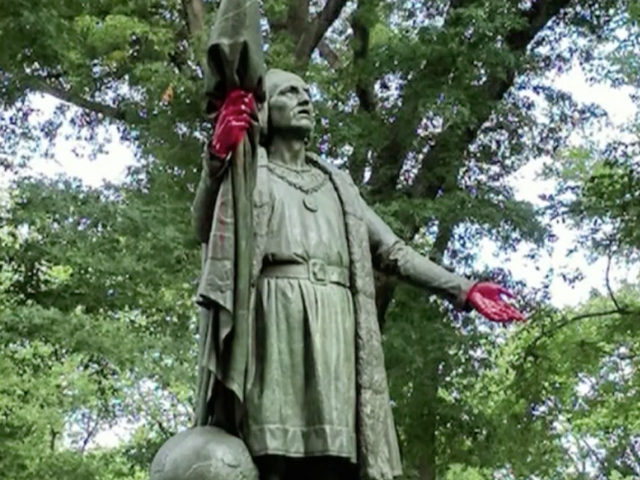Christopher Columbus discovered the Americas. What did Antifa ever do?
The group looks to do something about Columbus, or at least Columbus simulacrums, this Monday.
One Antifa group acts as a destroyer of the explorer. Specifically, the Revolutionary Abolitionist Movement plans a “Deface Columbus Day.” It falls on the national holiday bearing the explorer’s name, so the suit-and-tie, 9-to-5 Antifa types can surely participate in the day of destruction. Christopher Columbus statuary and celebrations face the “deface.”
The anti-holiday provides one more piece of evidence on the reflexive alienation of a significant chunk of Americans from their culture. Aside from mean-mugging “Merry Christmas!” greetings, the anti-Americans refuse to rise for the national anthem, mock people living outside of urban enclaves as ‘Muricans, and ridicule the idea that nations, or at least this nation, should feature borders. They want to demonstrate, loudly and visibly, that they regard this country as a bastion of oppression and bigotry, all the while living here without, save for the quadrennial threats of emigrating upon the election of some disfavored candidate, giving serious thought to living somewhere else. When they take a whack at Columbus bronzes, the statues do not even represent the man. They represent the wealthy and powerful country, which Columbus never set foot in, that eventually came about as a result of that man’s travels.
The group devised the event to “make it unequivocally clear that revolutionaries will always stand with the indigenous!” But it remains unclear, despite the exclamation point, precisely who within the Revolutionary Abolitionist Movement is an actual revolutionary. Clearly no such questions surround Christopher Columbus.
Columbus changed the world more than any man since Jesus Christ. And like all revolutions, the discovery of the Americas witnessed winners and losers. Europeans brought smallpox and the sword. But they also brought draft animals, the concept of zero, written language, and the wheel, strangely found on toys but nowhere else in the pre-Columbian Americas.
Columbus did not hate the indigenous the way their proxy pale-face defenders imagine it. He described the natives as “gentle,” “full of love,” “without greed,” and “free from wickedness.” Columbus imagined the Indians as “a people to be delivered and converted to our holy faith rather by love than by force.” He exclaimed, “I believe there is no better race.”
At the same time, Columbus, during his four trips, saw tribal warfare, cannibalism, castration, and slavery. The indigenous slaughtered the dozens of men he left behind in the New World. In other words, in 1493 the natives conducted a genocide on every white man in the Americas.
The Indians failed to live up to the navigator’s rosy description of them. Columbus, too, failed—both by the standards of his day and certainly by the standards of today. He tricked the locals to labor for him by using his charts to feign the theft of the moon during a lunar eclipse. He kidnapped natives to show off in Spain. He enslaved hundreds of Indians on his second trip. Columbus and his men also dined on a dolphin in that pre-PETA age.
Columbus certainly arrives to us through history as a great man if not always a good man. Though interested in bringing prestige and riches to the Spanish crown, he appeared preoccupied with planting crosses, Christianity, and converting.
If you hate Christianity and America, then hating Columbus follows. If you love Christianity and America, Columbus appears as a heroic figure. And since you can’t knock down 2.2 billion Christians or 320 million Americans, defacing a Columbus works to symbolically say that if you could you would.

COMMENTS
Please let us know if you're having issues with commenting.